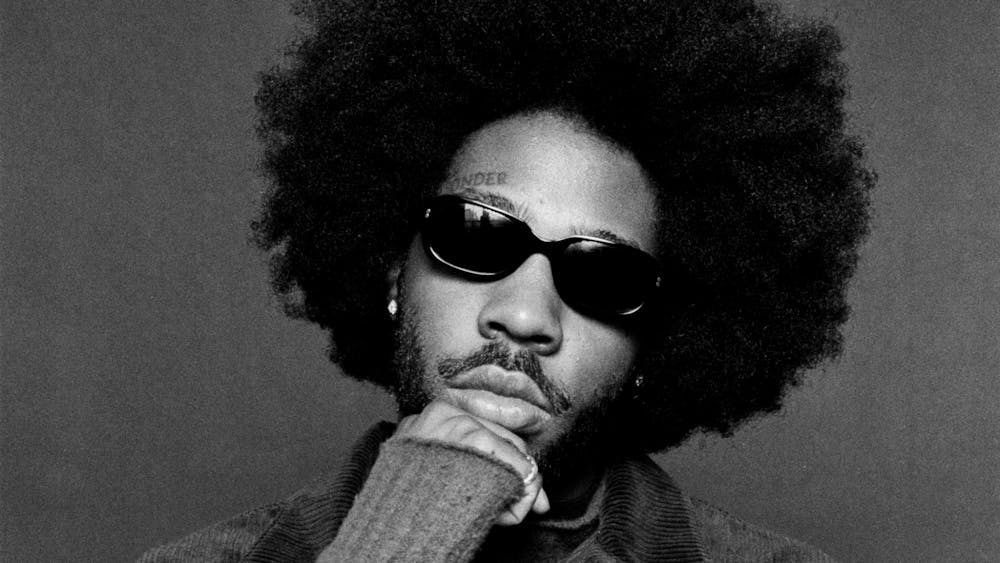The toxic lyrics of Brent Faiyaz have taken the world by storm since his breakthrough collaboration with Goldlink in 2016 — cue “Don't act like I'm your man, you just a fan / You don't hold rank.” As Faiyaz’s trademark honesty and alluring harmonies prevailed in EPs such as “Fuck the World” and “Lost,” the music of Faiyaz has taken a personality of its own. As explored in the initial track of “WASTELAND” — titled ”VILLAIN'S THEME” — the 26-year-old Maryland native is well aware of his own destructive tendencies. Faiyaz has accepted playing the villain and “WASTELAND” is a perfect reflection of that.
The soulful voice of Faiyaz is the backbone of this album. Staying true to Faiyaz’s style, “WASTELAND” relies on minimalistic beats, proving that there is power in simplicity. Faiyaz is confident in his ability to use his voice as an instrument through alterations in pitch and layered vocals. His angelic voice serenades the listener, nearly disguising his words’ dark underlying meaning.
“VILLAIN'S THEME” follows a conversation between Faiyaz and Jorja Smith as Faiyaz addresses his reputation. Faiyaz claims that “toxic” is a superficial and overused “Twitter Word,” to which Smith responds, “Shakespeare used it.” Smith then delivers the line, “The Taming of the Shrew,” referencing a Shakespearean tragicomedy and thus emphasizing the song’s themes of female submission, the danger of blind trust and economic inequality within relationships — each prime contributors to Faiyaz’s toxic reputation. Faiyaz explores the significance of the phrase, “toxic”— commonly associated with the singer — through the repetition of the lines, “Shakespeare used it” and “That’s a Twitter word.”
“VILLIAN’S THEME” ends with a question summarizing the overarching theme of “WASTELAND” — “What purpose do your vices serve in your life?” Faiyaz succeeds in redefining toxicity on the opening track as “temporary euphoria” resulting from the need to escape from the demands of fame and the music industry.
The animated tracklist is a rotation of drugs, sex and money that revolves around the egotistical personality of Faiyaz. Lyrics such as “B––, you just spilled Louis 13 on my McQueens” show his lack of empathy and materialistic priority. His arrogance prevails as he sings, “I never said that I was the best in the world / But I'm the best for you, girl.” It is a confidence that likely derives from his early rise to fame, yet Faiyaz maintains all that glitters is not gold.
Faiyaz uses tracks like “PRICE OF FAME” –– which revisits the theme that money can’t buy happiness –– to parallel his love for the money, women and drugs fame brings. He details success’ poisonous counterparts, delivering lines like, “They don’t wanna give you time to heal / They just wanna bleed you dry, for real” and “People screamin’ your name / I swear it isn’t everything / The demands / It isn’t everything.” His emotionally intense vocals are what narrate this memoir of fame.
Moreover, every featured artist brings their own unique voice to the table. As one of three previously released tracks on the record, “GRAVITY,” featuring Tyler, The Creator stands out as a high point on the album for its grabbing beat and including the Grammy award-winning artist. Each artist stunningly contributes with tracks like “FYTB,” featuring Joony and “GHETTO GATSBY,” featuring Alicia Keys. Keys’ renowned R&B voice perfectly matches with Faiyaz, while Joony adds refreshing Trap vocals that diversify the project.
“WASTELAND” differs from his previous album with its standout three skits –– short scenes of just audio –– each of which provides a backstory to the project’s themes. “SKIT: OBLIVION” and “SKIT: EGOMANIAC” paint a vivid picture of Faiyaz’s infidelity and neglect of his pregnant girlfriend.
“SKIT: WAKE UP CALL” stands as the project’s most jarring moment, opening with an alarming call from the mother of Faiyaz’s unborn child. The woman alludes to suicidal thoughts, after which listeners hear Faiyaz speeding through traffic while pleading for her to not put his child’s life at risk. The track, as the title suggests, presents an eye-opening experience for Faiyaz, who witnesses the consequences of his own indifference.
The final track opens with twanging, soulful keys reminiscent of Stevie Wonder, that bring forth a bittersweet sense of reality to close out the album. Titled “ANGEL,” Faiyaz contrasts the themes weaving through “VILLAIN’S THEME,” which marks Faiyaz’s acceptance of his own self-destructive behaviors. After depicting the fallout of his own selfishness, Faiyaz breaks down his own ego, admitting, “I look in the mirror and I see the worst parts of me.”
Faiyaz reflects on his tendency to use isolation as an escape, proposing that the woman he avoids –– an “angel in disguise” –– remains the only one who can bring him back to earth. After detailing Faiyaz’s internal struggle between idealism and pessimism, “ANGEL” provides a reality check, offering hope for Faiyaz’s ability to rely on positive distractions rather than vices.
If Faiyaz’s toxic mindset is what makes his music so distinguishable, the incessant demands and fleeting fruits of his success are what caused his reliance on temporary escapes, thus leading to his often shallow lyricism. While Faiyaz struggles with trust, vulnerability and the pull between idealism and pessimism, he takes moments to reflect on reality and understand his own flaws.
“WASTELAND” is nothing short of a lucid Shakespearean tragedy, emphasizing the real effects of negative coping mechanisms and egotism. Faiyaz admits to his own toxicity, questions the significance of the term itself, and attempts to reframe his notoriously superficial lyricism as clear-cut, transparent and real, cementing him as one of the most unfiltered lyricists in the R&B space.







